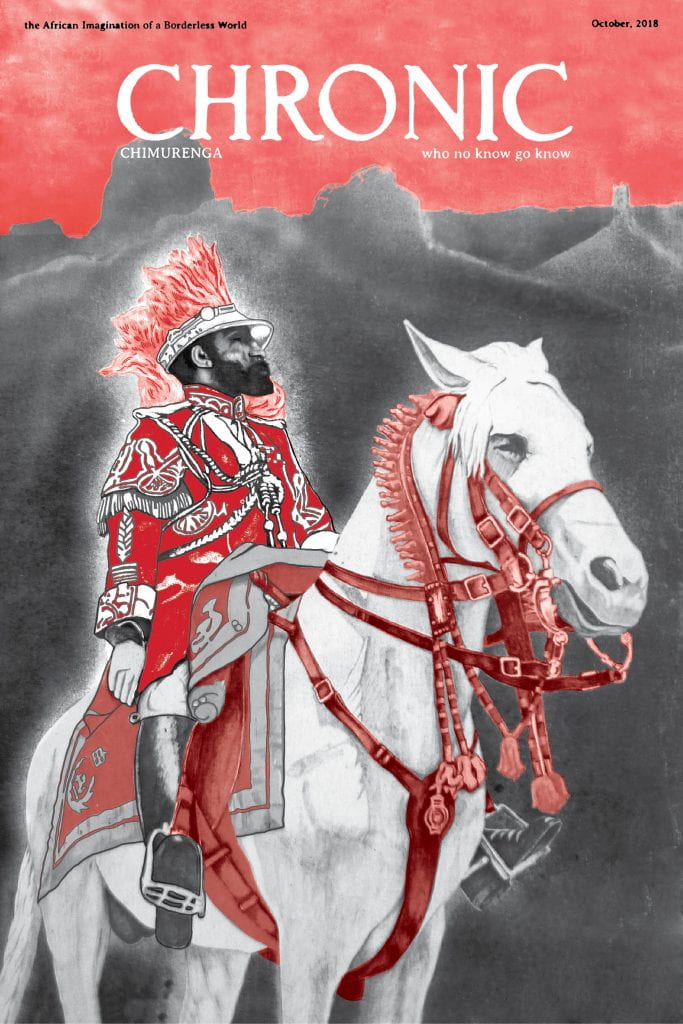By Madhu Krishnan.
The October 2018 issue of the Chimurenga Chronic, originally a quarterly (and now occasional) broadsheet produced by the Cape Town based Chimurenga collective, opens with a two-page spread titled ‘The African Imagination of a Borderless World’ . This title piece is comprised of two texts placed in juxtaposition. The first, a map titled ‘On Circulations and the African Imagination of a Borderless World’, serves as an ad hoc depiction of intellectual, cultural and political networks that spread across the globe, encompassing the Americas, Europe, Africa and Asia, tracing the movement of thought, ideas and anticipatory projections of the world across shifting pan-African movements over time. Here, for instance, it is possible to watch as mid-century Pan-Africanism flows into Congolese rhumba, in turn flowing into the post-Bandung Afro-Asian movement, then Marxism, then Cultural Studies and the work of Stuart Hall.
Accompanying this is a second text, titled ‘The Idea of a Borderless World’ by Achille Mbembe. Here, Mbembe sets his aims – aims which serve as an echo of the rest of the issue – in plain terms, stating his desire ‘to see whether and under what conditions we could re-engineer the utopia of a borderless world, and by extension, a borderless world, since, as far as I know, Africa is part of the world. And the world is part of Africa’. For Mbembe, as for the Chronic more broadly, this attempt, to see and to imagine and, by so doing, to return Africa to its place in the world, of the world and as the world, cannot be decoupled from its longer histories.
These histories are well known: the pillaging of the continent and expropriation of its resources; the colonial interruption; the long-term impact of enslavement and the trafficking of enslaved persons; the parcelling out of the continent amongst imperial powers in Berlin; forced migration, displacement and brain drain. Perhaps less known is the extent to which Africa’s intellectual resources, too, have been blighted by their exploitation under multinational capital and neoliberalisation, including the patenting by pharmaceutical corporations of traditional practices, and sometimes farcical attempts to monetise culture (best characterised, perhaps, by Disney registering to trademark the expression ‘hakuna matata’, a phrase which, incidentally, no Kiswahili speaker would actually say). In sum, as the South African critic Sabelo J. Ndlovu-Gatsheni argues, the continent’s place in the world can be characterized by its marginalization under the three faces of coloniality: the coloniality of power, the coloniality of knowledge and the coloniality of being.
And yet, there are other ways of conceiving of the continent beyond the commonly-held deficit view, even while recognising the material injustices that it has survived. It is precisely this task that the October 2018 issue of the Chronic partakes in, constituting an intellectual history and cartography of the world from an African centre of origin. Borders, boundaries and entrapments: the trappings of coloniality, on the one hand; versus networks, circulation and flow: the concept of the boundary, the border, not as immutable, impenetrable, but as permeable, evolving and in flux, a radically decolonial mode of knowledge production, on the other. This is a task made all the more urgent given how, as Sylvia Tamale reminds us, ‘colonial intellectualism deliberately denigrated Indigenous oral traditions and wisdom as illegitimate methodologies and tools of storing records’, enabling the perpetuation of the myth of African peoples as outside of history, outside of the world, static and fixed.
The editors of the Chronic position the October 2018 issue as ‘part of an ever growing library that re-images our world beyond so-called progressive discourse on “freedom of movement” and “no borders” against the backdrop of deeply Western individualist thinking’. In this respect, ‘The African Imagination of a Borderless World’ is an exemplar of the kinds of intellectual production that undergirds the larger project of the Black Humanities. This line of intellectual recuperation is one that relies, moreover, on the reconfiguration of the borders and boundaries that are perceived as absolute. By re-constituting an archive of knowledge(s), movements and circulations of understanding, which have been effaced under coloniality, the Chronic participates in the effort to make visible the temporalities, genealogies and modalities that have always arisen from the intellectual and cultural labour of Black and African peoples. This is a kind of knowledge production that travels and is characterised by mobilities and circulations, which defy the rigid topographies of colonialism/coloniality in favour of an ungovernable vision of space and time that is, all the same, productive of a logic of its own.
The Chronic thus provides one small example of the ways in which cultural study and the Black Humanities can offer us ways of understanding intellectual histories and intellectual mappings whose own movements might be unexpected, unorthodox or function outside of the typical boundaries of the academy. Projects like the Chronic, which is one amongst many instances of independent cultural and intellectual production from the African continent and its diasporas, illustrate the urgency of transversal approaches to the archive, to bibliography and to our concept of the library more widely. At the same time, these projects are not merely abstract: to return to Mbembe’s ‘The Idea of a Borderless World’, they speak directly to the African continent’s place in the world and the world’s place within it, with all of the material impact that may have.


